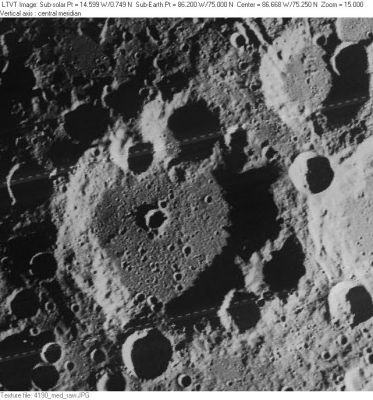Brianchon
Contents
Brianchon
(formerly Carpenter C)
|
Lat: 75.0°N, Long: 86.2°W, Diam: 134 km, Depth: 3.7 km, Rükl: 3 |
LO-IV-190M Brianchon's rim is interrupted on the north by 50-km Brianchon A, and on the south (just to the left of the centerline) by 31-km Brianchon B. The 67-km crater in the upper right is Poncelet C, and the large light area below it (along the right margin) is the western part of 115-km Pascal.
Images
LPOD Photo Gallery Lunar Orbiter Images
Maps
(LAC zone 9B3) USGS Digital Atlas PDF
Description
Description: Wikipedia
Additional Information
Depth data from Kurt Fisher database
- Westfall, 2000: 5.36 km
- Measures on LRO QuickMap give depth about 3.7 km
Nomenclature
- Named for Charles Julien Brianchon (1783-1864), a French mathematician and chemist. Brianchon is best known for his proof of Brianchon's theorem (1810).
- This feature was Catalog Numbers 1360 and 1695 in Mary Blagg's Collated List (1913), where it is said to have been called Anaximander C in Neison, 1876 and Anaximenes C in Beer and Mädler. It entered the original IAU nomenclature of Named Lunar Formations (1935) as Carpenter C (Catalog Numbers 1695). A note there mentions the same feature was labeled by Franz as Anaximander d.
- The replacement name Brianchon was given by Arthur and Whitaker in the Rectified Lunar Atlas (1963) and approved by IAU in 1964.
- A pronounced valley between Brianchon and Sylvester (north of Brianchon, east of Froelich) is unofficially called Vallis Sylvester by D. Caes. See LAC 9 in the Clementine Atlas (the upper right corner of LAC 9). Note that this valley is NOT Catena Sylvester!
- A very narrow valley running through Brianchon A at the northern part of Brianchon's rim is unofficially called Vallis Brianchon A by D.Caes
LPOD Articles
Bibliography
